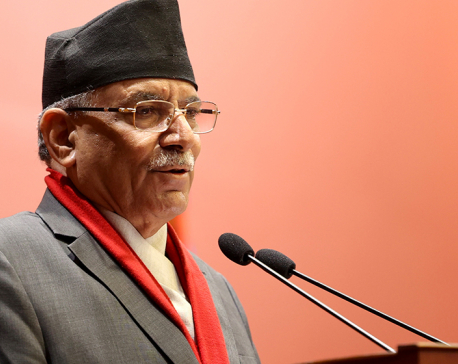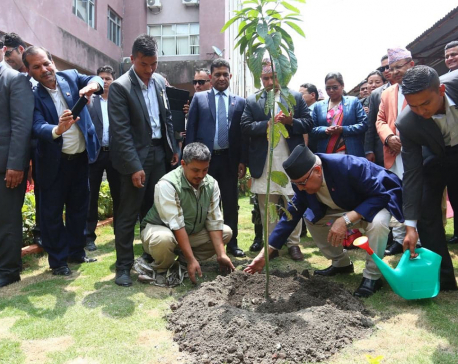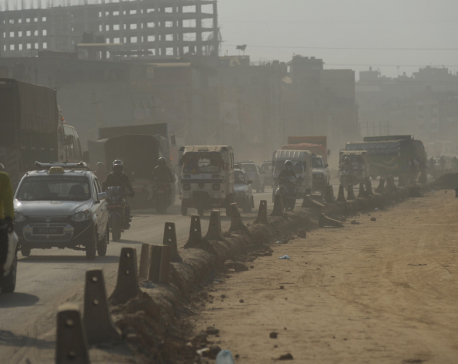
OR
#World Environment Day
Nepal's environmental budget: Is it sufficient to tackle the urgent crisis?
Published On: June 5, 2023 01:53 PM NPT By: Sara Pahari

KATHMANDU, June 5: The annual budget unveiled by the government earlier last drew media headlines as the government has allocated a substantial budget of Rs 15.56 billion for the forest and environment sector in the fiscal year 2023/24. The move has been hailed as a significant step towards promoting environmental conservation, sustainable forest management, preserving biodiversity and ensuring sustainable utilization of resources. However, as Kathmandu– the federal capital city of the country– tops the list of the most polluted cities in the world, questions arise regarding the adequacy of the budget to address the pressing environmental issues.
The alarming state of Kathmandu's pollution
Kathmandu Valley has unfortunately earned the dubious distinction of being the world's most polluted city in terms of air pollution. With an Air Quality Index (AQI) score of 202, the air quality is categorized as very unhealthy, posing severe risks to public health. Factors contributing to this alarming situation include fires in various parts of the country and the burning of agricultural residues. The consequences are devastating, with respiratory diseases, lung cancer, heart problems, hypertension, and stroke cases increasing in recent years. Shockingly, studies reveal that air pollution accounted for the deaths of 42,000 people in Nepal in 2019, with vulnerable groups such as children under five years and individuals above 70 years being disproportionately affected.
The government's environmental budget
While the government's allocation of Rs 15.56 billion for the forest and environment sector demonstrates a commitment to environmental conservation, it begs the question: Is this amount sufficient to tackle the urgent environmental challenges faced by Nepal? The severity of Kathmandu's pollution crisis, along with the significant health risks it poses to its residents, raises concerns about the adequacy of the budgetary measures.
Investment in sustainable solutions
To effectively combat air pollution, comprehensive measures and robust investments are essential. While the budget aims to promote enterprise development, contribute to the national economy, and foster a harmonious relationship between nature and human activities, it is crucial to evaluate whether these initiatives are enough to address the critical situation at hand. Allocating funds for the development of conservation areas and community forests as eco-tourism destinations is undoubtedly a step in the right direction, but the magnitude of the pollution problem requires urgent and sustained action.
Steering towards a greener future
Electric buses hold immense potential in combating environmental degradation by reducing air pollution and promoting cleaner transportation. Despite the current challenges faced by Sajha Yatayat in operating their electric bus fleet due to a lack of charging stations and parking spaces, it is crucial to acknowledge the government's commitment to promoting sustainable transportation and its positive impact on the environment.
The purchase of these electric buses clearly demonstrates the government's dedication to fostering clean and sustainable transportation options. By investing in electric buses, the government aims to mitigate carbon emissions and enhance air quality in the region.
Although there have been delays in establishing suitable charging infrastructure and parking facilities for the buses, it is important to perceive these setbacks as temporary obstacles rather than a failure of the overall initiative. The government has shown awareness of the need for charging infrastructure and has established committees to address this issue, underscoring their determination to overcome these challenges and ensure efficient bus operations.
Beyond environmental conservation, electric buses also contribute to reducing noise pollution and improving the overall quality of life for urban residents. Embracing electric buses enables cities to create more pleasant and healthier living environments.
While the operational difficulties faced by Sajha Yatayat should not overshadow the positive environmental impact of electric buses, it is imperative to acknowledge that the lack of charging stations and parking spaces is a current issue that can be resolved through proper planning and collaboration among the government and relevant stakeholders.
On this World Environment Day, let us focus on the potential of electric buses in combating environmental degradation. The efforts made by Sajha Yatayat and the government to promote electric vehicles should be recognized as significant strides toward creating a sustainable and cleaner future. With adequate infrastructure development and continued support, electric buses can play a vital role in reducing pollution and preserving our environment for generations to come.
While the government's allocation of a substantial budget for the forest and environment sector in Nepal is a positive move towards environmental conservation, the gravity of the environmental crisis, particularly in Kathmandu, demands a critical assessment of the sufficiency of these funds. It is imperative for policymakers, environmental experts, and stakeholders to collaborate closely, identify gaps, and explore additional measures and resources to effectively tackle the pressing issues of pollution and environmental degradation. Only through a concerted and comprehensive approach can Nepal hope to achieve a greener, healthier, and sustainable future for its citizens and the planet.
You May Like This

PM Dahal urges all to unite for environment conservation
KATHMANDU, June 5: The World Environment Day is being marked today around the theme #BeatPlasticPollution. ... Read More...

World Environment Day 2019 being observed today
KATHMANDU, June 5: Various programs are being organized across the country today to mark the World Environment Day 2019. ... Read More...

'Effective utilization of budget and human resources could lessen environmental hazards'
KATHMANDU, June 5: With lots of gloomy reports released globally, the World Environment Day which is observed worldwide on June... Read More...





Just In
- World Malaria Day: Foreign returnees more susceptible to the vector-borne disease
- MoEST seeks EC’s help in identifying teachers linked to political parties
- 70 community and national forests affected by fire in Parbat till Wednesday
- NEPSE loses 3.24 points, while daily turnover inclines to Rs 2.36 billion
- Pak Embassy awards scholarships to 180 Nepali students
- President Paudel approves mobilization of army personnel for by-elections security
- Bhajang and Ilam by-elections: 69 polling stations classified as ‘highly sensitive’
- Karnali CM Kandel secures vote of confidence














Leave A Comment